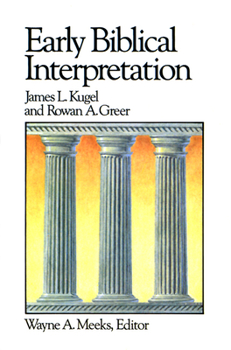Early Biblical Interpretation
Select Format
Select Condition 
Book Overview
This highly accessible book discusses how the early Jewish and Christian communities went about interpreting Scripture.The Library of Early Christianity is a series of eight outstanding books... This description may be from another edition of this product.
Format:Paperback
Language:English
ISBN:0664250130
ISBN13:9780664250133
Release Date:January 1986
Publisher:Westminster John Knox Press
Length:220 Pages
Weight:1.10 lbs.
Dimensions:0.6" x 5.9" x 9.2"
Customer Reviews
1 rating
Major Factors that Shaped Early Scriptural Interpretation
Published by Thriftbooks.com User , 17 years ago
"In the matter of biblical interpretation, if we are not to fantasize about the imperfections and the mistakes of the past, we have to take a close look at how past scholars have made sense of Holy Writ and to ask whether what they said is useful or misleading, perceptive or simply outdated?" Bruce Metzger State of Biblical Interpretation: With the emergence of the postmodern Western world, even among the most conservative Christians, the change in contemporary view of the Bible, has radically shifted within our culture. We no longer quote the Bible for definitive scientific information about world history, geography, geology, and astronomy, and most other domains. Nobody now believes the sun rotates around the Earth, whatever the Bible was interpreted, scoring one for Galileo against his Inquisitors. The only remnant of the universal validity that was attached to the Bible, many years ago is the stand on the factual nature of the two stories of creation in Genesis. "In this matter ..., contemporary biblical scholarship appears to be departing from the centripetal focus of inquiry prevalent in the 19th and throughout most of the 20th centuries and returning to the appreciation of diversity of method exemplified in ancient scholars such as Philo, Origen, the rabbis, the DSS community, Augustine, etc." Alan J. Hauser History of Biblical Interpretation: Scientific reconstructive criticism has shown the importance of understanding the social, political, and economic milieu within which a biblical text was formed or edited. We thus must examine those forces which initiated the subsequent strata of interpretation and still motivate our own appreciation of the textual interpretive process. The impact of this awareness catalyzed modifying interpretation methods in many important ways. Professor Hauser underlines the importance of such dramatic changes in interpretation, that has encountered biblical studies, during the past half century. These changes are bound to change the way in which Biblical scholars analyze and assess the history of the interpretive process, within methods for conducting biblical exegesis. The realization that employing a number of different approaches to understanding a biblical text can contribute richness to our understanding of that text, between other changes in contemporary biblical interpretive methodology, changed our understanding of the history of interpretation. In recent biblical studies, the line between a biblical text and its interpretation is dimmed. Biblical interpreters interaction with the text is a dynamic changing one, rather than the ancient process of probing a static text to discover its meaning, literally or allegorically as have been the case with the Antiochene and Alexandrine traditions that prevailed since the Apostolic Fathers, and dominated late antiquity. That was just as true for ancient biblical interpreters as it is for us today. Even Apostle Paul is being now portrayed as was extracting





